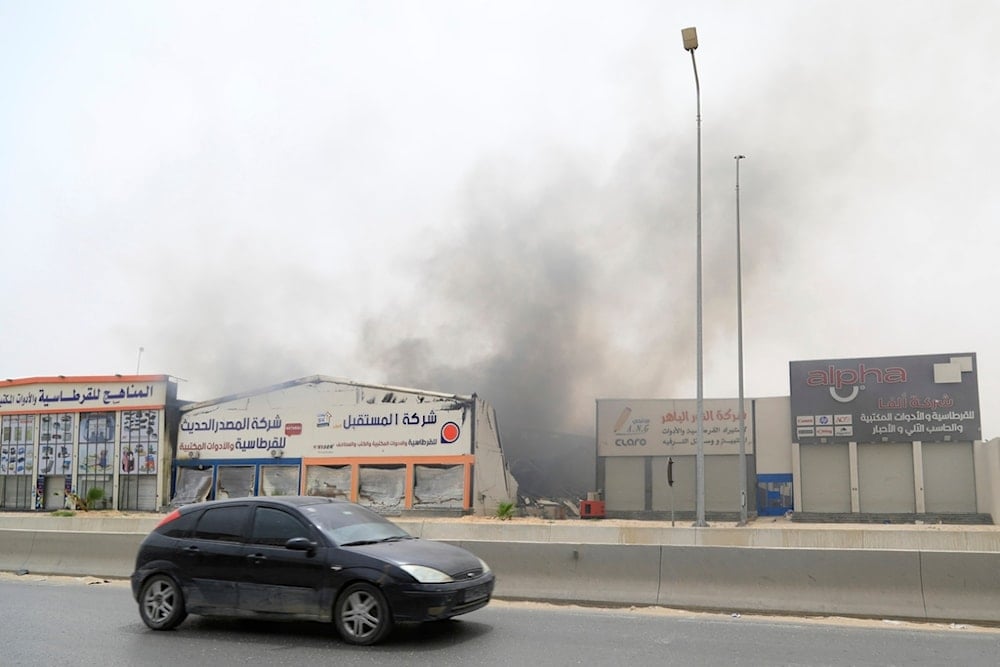Libyans block roads, demand unity government’s removal
Libyan protesters blocked roads in Tripoli demanding Dbeibeh's resignation, justice for the NOC raid, and accountability for the Al-Kikli killing.
-

Smoke fills the sky near the site of clashes between heavily armed militias in Tripoli, Libya, Wednesday, May 14, 2025. (AP)
Protesters blocked access to Libya’s Foreign Ministry headquarters in central Tripoli on Wednesday, paralyzing traffic in key areas including al-Furnaj, al-Sabaa, Zanata, and Ain Zara. Demonstrators carried banners demanding the resignation of Prime Minister Abdul Hamid Dbeibeh and accountability for those involved in the recent storming of the National Oil Corporation (NOC).
Social media users across western Libya, including in cities such as al-Zawiya, Sorman, Tajoura, Janzour, and Ain Zara, circulated videos showing roads shut down by protesters burning tires and denouncing the continued rule of the Dbeibeh government.
The protesters called for the downfall of the Government of National Unity (GNU), demanding a “radical overhaul of the Libyan political scene,” while expressing frustration over the persistent absence of effective security institutions.
Series of violations by SSA
According to Alwasat news website, Libya’s Attorney General Al-Siddiq Al-Sour held a meeting with law enforcement and parliamentary representatives to address a series of violations attributed to the now-dismantled Stability Support Apparatus, whose head, Abdulghani al-Kikli, was killed in Tripoli on May 12.
The meeting also reviewed the recent armed clashes in the capital and discussed complaints and legal proceedings linked to human rights abuses allegedly committed by members of the defunct security force. Authorities examined reports of missing persons and the status of official investigations.
The attorney general also looked into injuries sustained by protesters and security forces during the recent demonstrations, as well as the deaths of detainees in state-run reform and detention centers. The discussion included updates on efforts to enforce judicial rulings, locate escaped convicts and pre-trial detainees, and prosecute suspects accused of theft during the period of unrest.
The violence in Tripoli erupted on May 12 following news of the assassination of Abdulghani Belgasem Khalifa al-Kikli, head of the Presidential Council-affiliated Stability Support Apparatus. By May 14, armed clashes had spread between the Radaa Force and Brigade 444, reaching several neighborhoods including Zawiyat Al-Dahmani, Ain Zara, and the vicinity of the Prime Minister’s office.
Tensions rise after clashes, resignations
The Libyan political crisis intensified after armed groups engaged in deadly confrontations earlier in the week. Despite a return to partial normalcy, flights resumed, shops reopened, and workers returned, Tripoli remains on edge.
The government reported that a police officer was killed by unknown assailants while guarding Dbeibah’s office during the protests. Meanwhile, local media revealed that six ministers and deputy ministers from Dbeibah’s cabinet had submitted resignations, though only two have confirmed their departure publicly.
Several municipal councils in western Tripoli declared their support for the protesters’ demands. Khaled al-Mishri, head of the High Council of State, announced he had begun discussions with the eastern-based parliament to select a national figure to form a new government, indicating potential cross-regional cooperation.
Libya remains divided between two rival administrations: the UN-recognized government in Tripoli led by Dbeibah, and a parallel authority based in the east, dominated by the family of military commander Khalifa Haftar.

 4 Min Read
4 Min Read










